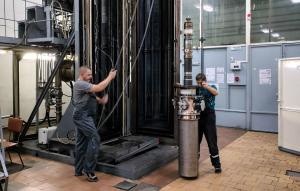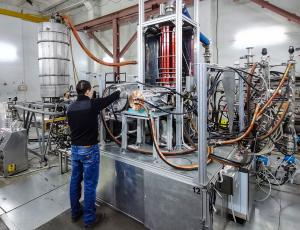Russia ships four gyrotron sets
Last week, the trucks left the GYCOM enterprise in Nizhny Novgorod (Moscow region) carrying four gyrotron sets—high-tech devices for auxiliary plasma heating and current drive designed for exceptionally challenging power and frequency requirements (1 MW at 170 GHz). Twenty-four gyrotrons sets will be part of ITER's electron cyclotron resonance heating system, each one generating a microwave beam over a thousand times more powerful than a traditional microwave oven. These microwave beams will travel along 160 metres of waveguide and then launch into the ITER Tokamak to ionize the neutral gas and generate the very first ITER plasma, in much the same way that a spark plug ignites a car motor. Eight gyrotrons must be in place for ITER's First Plasma (four from Russia and four from Japan).
Russia developed the first gyrotron back in 1964, generating 6W at 10GHz for continuous operation. Since then, scientists around the world have steadily increased gyrotron output power. The Institute of Applied Physics of the Russian Academy of Sciences is engaged in the development and scientific guidance for the creation of these unique devices, while their fabrication is carried out at GYCOM.
Anatoly Krasilnikov, director of ITER Russia, celebrated the achievement. "It is difficult to overestimate the importance of the supply of Russian gyrotron sets, because without these highly sophisticated systems it is impossible to obtain First Plasma in the reactor. [...] This [milestone] is the result of many years of diligent work of our scientists and engineers who have tremendous experience and groundwork in the manufacture of such devices."



